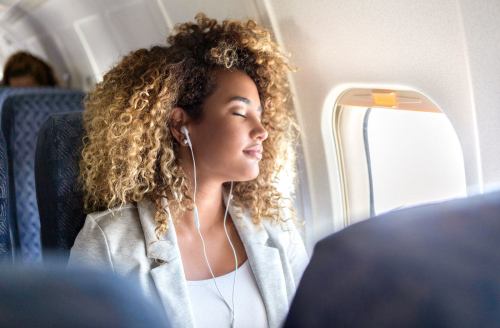Our editors independently select these products. Making a purchase through our links may earn Well+Good a commission
What’s the deal with people who don’t get jet lag—and how can I be more like them?
Why do some people get jet lag and others don't? Sleep experts share their insight on jet lag prevention, including how to avoid it on your next trip.

Traveling is the best. New places! New foods! New Instagram-worthy photos to send everyone back home! But jet lag? Not so much. There’s nothing that will harsh your vacation high faster than stepping off a nine-hour flight, checking into your hotel, accidentally closing your eyes…and immediately falling asleep for the next 13 hours.
It’s even more inconvenient if you’re traveling with someone who doesn’t get jet lag. What are you supposed to do when you’re fighting to keep your eyes open while your traveling companion is ready for a wine-and-cheese fueled tour of Paris?
Jet lag, per the National Sleep Foundation, is an “imbalance in your body’s ‘biological clock’ caused by traveling to different time zones.” Basically, your sleep patterns are dictated by your body’s circadian rhythms (the mechanism in your body that responds to light and dark, which is what tells your body to start producing melatonin). Everyone’s circadian rhythms are different, which is why you might be a morning person while your boyfriend loves burning the midnight oil. And messing with those natural rhythms (like traveling on a 23-hour flight to Tokyo), can cause exhaustion, brain fog, trouble sleeping, and all the other fun symptoms of jet lag.
Rebecca Robbins, M.S., Ph.D., of the Center for Healthful Behavior Change at NYU School of Medicine and co-author of Sleep for Success! recommends thinking of it this way: Have you ever stayed out really late on a Friday night and then slept in on Saturday morning? You’re asking your body to adjust really quickly to a huge change in your sleep routine. The same thing happens when you travel across time zones: You might have crossed the Atlantic to Paris, but your body still thinks you’re in New York.
Unfortunately, there’s no easy explanation as to why some people are hit harder by jet lag than others. Christine Hansen, sleep coach and founder of Sleep Like a Boss, says it may come down to “how good of a sleeper you are, how much sleep you need, and whether you already have sleep debt.” In other words, if you’re already sleep deprived, or you suffer from some kind of sleep disorder, you’ll probably have a harder time recovering from jet lag than someone who doesn’t have sleep problems.
It may also have something to do with how you travel. If you can sleep well on planes (and if you do, please tell me your secrets!), “you’ll handle jet lag a lot better,” Hansen says. Dr. Robbins, agrees, pointing out that before we had the ability to cross time zones in a flash, we didn’t have these problems. “Now that we do, we’re asking a lot of our bodies,” she says.
However, all is not lost; there are a few steps you can take to minimize jet lag before you go. To start, Hansen recommends that, if possible, you schedule your flight so that you land in the morning or during the day of your end destination. “It’s much easier for the body to [adjust] in the day time,” she says.
Dr. Robbins suggests prepping in the week ahead of your travel by adjusting what time you turn in. For example, if you’re flying from New York to London, try going to bed 15 minutes earlier each night until you’ve added an hour and a half to your sleep schedule—this way, you’ll be well-rested ahead of your flight.
She also says you should always travel with an eye mask. It won’t just remind you of home (which can help you relax, and thus sleep better, Dr. Robbins says) but it’s key for blocking out light on the plane or in the hotel—and that darkness will help your body get on track when it comes to sleep.
Hansen also swears by Time Shifter, an app that specifically helps you fight jet lag. (According to Travel + Leisure, it was designed in conjunction with a sleep expert at Harvard Medical School, so you know it’s good.) All you have to do is enter some details about your usual sleep habits (for example, your normal bedtime, whether you take melatonin or other sleep aids) as well as where you’re headed, and the app will provide helpful tips on how to adjust to your new destination.
You’ll also want to steer clear of booze. (I know, I know.) As tempting as a celebratory vacay nightcap sounds, both experts say that heavy alcohol consumption will worsen your jetlag symptoms. And resist the urge to nap when you land. If you’re in desperate need of shut-eye, set the timer for 20 minutes—any longer, and your circadian rhythms will be thrown off, making it harder to adjust to the local time, Dr. Robbins says.
Hopefully these tips will help you push through the first couple of rough nights in you new locale—soon enough, you’ll wake up as #brighteyed and #bushytailed as the locals.
What’s with people who don’t get hungover, either? And here’s how to fight jet lag like a flight attendant.
Sign Up for Our Daily Newsletter
Get all the latest in wellness, trends, food, fitness, beauty, and more delivered right to your inbox.
Got it, you've been added to our email list.










